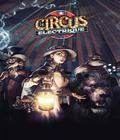It's sometimes easy to look at a game that takes obvious inspiration from another game and feel like it might be a cheap knockoff. At first blush, Circus Electrique may look like it's borrowing core ideas and gameplay mechanics from indie hit Darkest Dungeon. However, it's also a great example of why taking a concept doesn't mean that you can't do it well. Electrique has more in common with Darkest Dungeon than it doesn't, but it's also a darn fun game on its own.
Circus Electrique is set in an alternate version of Victorian England. A mysterious "spark" caused all of the world's greatest inventors to suddenly jump decades ahead in technology, thus transforming the city in a steampunk paradise. The story follows Amelia, a young woman whose mother died in a tragic circus accident. The same circus that led to her death, Circus Electrique, is now reopening under the same management, and Amelia intends to investigate it in her new role as a reporter. At the opening show, something mysterious occurs. Londoners all over are taken by something called "The Maddening" and begin going on a violent rampage. Amelia and the circus crew must band together and figure out what is causing the rampage and how it ties to the accident that had shut down the circus in the first place.
The plot is cute enough, but it feels a bit strange at times. It veers between dark comedy and family drama, which can make it difficult for either one to set the tone. By and large, it's a cute experience, and the characters are likeable. Beyond the odd tone shifts, the game foreshadows a touch too heavily, so players will be able to figure out most of the plot twists far in advance; dragging them on to the reveal feels like a waste of time.
Combat in Circus Electrique is very much in the vein of Darkest Dungeon. You and the enemy each have a four-slot "battlefield" to position each character. Characters can attack once a turn, with each character having a variety of options available, depending on which slot they are in. One character may have a strong buff spell in the back row but more powerful CC if they're in the second or third slot. Likewise, a strong fighter can hit the front rows hard but is effectively useless against foes in the back line until the front line is beaten down. Many combat options also allow you to move enemies around, which can force foes into weak areas or allow you to position an enemy in hazard zones. They can do the exact same to you, and aside from bosses, most of the enemies follow very similar rules to your own party members.
Units in Circus Electrique are based around circus performers. The Strongman is a front-line tank who can bash foes with his barbells and pump himself up. The Clown can use tricks to buff and debuff. As the game progresses, you get more wild options, including acrobats, fakirs, knife throwers, and robot bears, each with their own distinct gimmicks. Figuring out synergy is important to success. For example, the Strongman has an absurdly powerful move that does a ton of damage but has low accuracy, so the Clown's ability to buff accuracy goes a long way. The Fakir can harm themselves to do damage or provide buffs, which is where having some reliable source of health recovery helps. There's a lot of neat interplay between classes, and the game rewards you for experimenting, especially since you'll get new classes up to the end of the game.
Also playing into combat is the Devotion meter. Both enemies and allies have Devotion, which is somewhat akin to Sanity in Darkest Dungeon but with some differences. Devotion represents a character's battle morale and has both positive and negative effects. At high Devotion, a character does more damage, gains bonus effects to attacks, or has a chance to get a positive "mood" to get a temporary buff. At low Devotion, they do less damage and have a chance of negative modifiers. If Devotion runs out, the character flees from the battlefield. Attacks that target Devotion serve as a sort of second HP bar. Some attacks are also fueled by Devotion, which means you must spend some of your precious resource for an effect.
On the player's side, targeting Devotion is usually best for powerful, tanky enemies. If a foe isn't taking much physical damage, you target Devotion instead. This can involve reshuffling your party and often requires riskier formations. Enemies whittle down your Devotion as readily as your HP. You need to have characters perform in the circus to efficiently build up their Devotion, which serves as an additional limit on your performer's ability to fight without rest.
Performing at the circus isn't as simple as it sounds. You need to assign three performers (or more, for higher-level acts) to the circus for the day. Anyone performing in the circus can't participate in battles or other events. Each character has their own set of "circus" stats that influence how successful the final act will be. In addition, performers have likes, dislikes and preferred roles. Some performers like (or dislike) working with other performers, which can have a negative or positive impact on the outcome. Likewise, characters with a higher Devotion level are more likely to succeed, but characters with a lower Devotion level need to perform to keep up their spirits.
The circus' success grants stars, which can be put into one of three different trees: Circus Fame, Resources and EXP for performers. Each different show has different maximums and values, but the more stars you earn, the more diverse a selection of rewards you can get. Early on, getting more than two or three stars is a chore, but as your team develops, it gets easier to gain stars.
This balancing act prevents you from having one team that you use over and over again. You'll need at least two teams who synergize in combat and under the big top. You'll also need some extra folks to cover if someone gets too hurt. It's a pretty fun system and feels a bit like Darkest Dungeon's but feels less punishing. Beyond taking huge chunks of damage, your hired performers are always doing something, whether it's earning money or fighting baddies. It's a fun balancing act as you try to create the perfect stable of fighters and performers.
The area where Circus Electrique differs most from Darkest Dungeons is in the structure of the actual levels. You go through multiple maps of London, each with its own set of pathways, but these aren't true expeditions. You can go back to your hub at any time without losing progress, and even when you choose a path, you can eventually spend an item to go back and redo levels to take alternate paths. This means you have more limited resources to work with, since you need to follow a set path, but you get more options to grind for (some) resources as the game progresses. It is a largely linear game, so if you want to continue exploring, your goal is to finish the plot and unlock the ability to keep playing after the game ends.
Part of the reason for this design change is that Circus Electrique expects you to constantly change out characters. While you can get pretty far with a set strong team, you're going to eventually run into problems. Weather plays a part in battles and can improve or ruin certain characters. Rainy weather is great if you use lightning elements, but fire-focused characters like Fire Breathers suffer a massive debuff, so bringing one into battle can leave you with a helpless character. Night battles gradually build up a reinforcement meter every time you attack, so you're rewarded for bringing characters who can buff themselves heavily and finish foes off in one attack.
This means you want a stable of characters who can swap in and out, but you need to consider multiple factors. Characters can get bored (which lowers Devotion and may lead them to leave the circus if neglected), which means you can't keep a giant stable of characters. In addition to combat and the circus, you can also assign characters to train to gain levels, assist with passive buffs on the map screen, and a few other tasks. Doing this drains resources that you might need to upgrade the circus or characters.
The result is a pleasantly meaty balancing act. You need to keep your combat team fresh, your shows novel, and your employees entertained. If a character gets hurt in combat, they'll need to heal, but you'll need to bring in someone to replace them in your combat team, which might leave you short of performers for the circus troupe. It isn't overly punishing, but the game encourages you to decide who fits your team and who doesn't. I had to let go of characters that I'd used for a long time because they didn't fit into the overall lineup of the team.
Circus Electrique isn't as hardcore as something like Darkest Dungeons, but it has enough bite to be interesting. There is an Easy mode that adds additional resources and free partial healing between battles, but the Normal mode of the game feels nicely balanced. Some classes are way better than others, but I'm sure there are team compositions that could shine even more.
Circus Electrique is a charming-looking game. The character models are all bright and well-animated, and there are a lot of incredibly delightful animations. The "drone pilot" enemy has a floating robot clonk down on his head in a comical fashion when defeated, while a particularly strong blow might send an enemy rocketing off-screen. My personal favorite is the robot bear's adorable dancing animation. It's a colorful and charming game, but I wished that Amelia was as much of a narrator as the Darkest Dungeon's omnipresent voice of the ancestor.
Circus Electrique is a great example of how being a "clone" doesn't mean being boring or bad. You can trace the game's roots back to Darkest Dungeon, but it has enough of its own charm and style to make it a worthwhile experience on its own merits. It's more linear and less punishing, which has the potential to make it fair and more accessible than its darker predecessor. I was engaged from start to finish, so it's well worth your time if you're looking for something to scratch the classic Darkest Dungeon itch or if you really like the circus aesthetic.
Score: 8.0/10
More articles about Circus Electrique











 Circus Electrique is part story-driven RPG, part tactics, part circus management, and completely enthralling– all with a steampunk twist.
Circus Electrique is part story-driven RPG, part tactics, part circus management, and completely enthralling– all with a steampunk twist.







